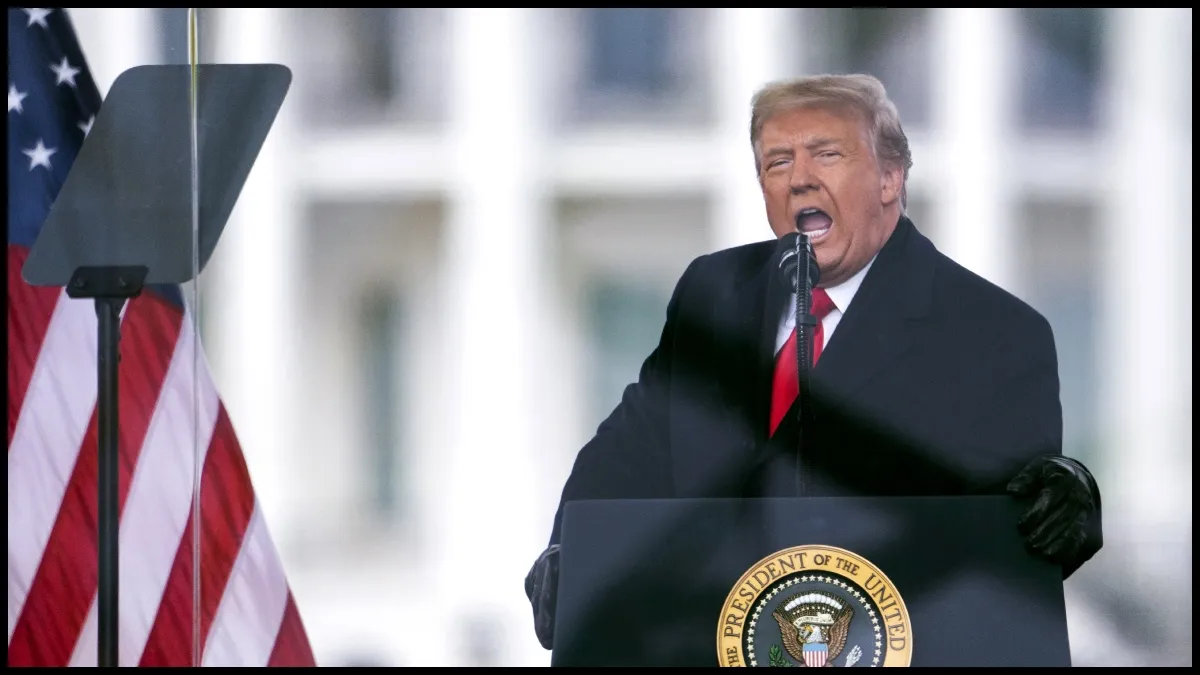Washington: A federal appeals court on Tuesday ruled that former US President Donald Trump is not immune to prosecution for his alleged plots to overturn the results of the 2020 presidential elections, rejecting his claims of immunity and bringing the 77-year-old Republican frontrunner close to an unprecedented criminal trial. This is the second time US judges have rejected Trump's claim of immunity from legal cases that seek to look into his alleged involvement in inciting an attack on the Capitol building on January 6, 2021.
A three-judge panel of the US Court of Appeals for the District of Columbia Circuit rejected Trump’s claim that he cannot be prosecuted because the allegations relate to his official responsibilities as president. "We cannot accept that the office of the Presidency places its former occupants above the law for all time thereafter," the unanimous panel wrote.
The court said that any executive immunity that would have shielded Trump during his tenure as the US president "no longer protects him against this prosecution". The former president has vowed to appeal the decision, which his spokesperson described as "threatening the bedrock of our Republic".
"Without complete immunity, a President of the United States would not be able to properly function!" the spokesperson, Steven Cheung, said in a statement. He said Trump would appeal, but did not say whether he would first ask the full DC Circuit Court to review the ruling or appeal directly to the US Supreme Court. The case will remain paused until at least Monday to give Trump time to appeal to the US Supreme Court.
Why did Trump claim immunity?
Trump’s lawyers argued that former presidents were entitled to sweeping legal protections and could not be criminally prosecuted for official actions unless first impeached by the House of Representatives and removed from office by the Senate. Trump was impeached twice by the then-Democrat-controlled House, but Senate Republicans managed to acquit him of the charges.
The former US President has repeatedly denied his role in inciting the mob of his supporters that attacked the US Capitol in January 2021 after President Joe Biden was declared the winner of the previous elections. However, the judges strongly remarked that presidential immunity would mean that "as to the President, the Congress could not legislate, the Executive could not prosecute and the Judiciary could not review".
They also sharply rejected Trump’s claim that “a President has unbounded authority to commit crimes that would neutralise the most fundamental check on executive power — the recognition and implementation of election results", while also rejecting that the executive can also violate the rights of individual citizens to vote and to have their votes count.
The Supreme Court has held that presidents are immune from civil liability for official acts, and Trump’s lawyers have for months argued that that protection should be extended to criminal prosecution as well. They said the actions Trump was accused of in his failed bid to cling to power after he lost the 2020 election to Biden, including badgering his vice president to refuse to certify the results of the election, all fell within the “outer perimeters” of a president’s official acts.
However, special counsel Jack Smith, who led the prosecution, argued that no such immunity exists in the US Constitution or in prior cases and that, in any event, Trump’s actions weren’t part of his official duties. US District Judge Tanya Chutkan, who is presiding over the case, rejected Trump’s arguments in a December 1 opinion that said the office of the president “does not confer a lifelong ‘get-out-of-jail-free’ pass.
What happens to Trump now?
The indictment brought by Smith accuses Trump of using false claims of voter fraud to pressure state lawmakers, Justice Department officials and then-Vice President Mike Pence to thwart the certification of the election results. It is one four criminal cases facing Trump and one of two alleging interference in the 2020 election.
Trump has pleaded not guilty to four felony counts and accused prosecutors of a politically motivated effort to damage his campaign. He has repeatedly voiced his immunity claim on the campaign trail and social media, warning that his future administration could prosecute President Joe Biden, his likely opponent in the November election, if he returned to the White House.
His appeals have already delayed the start of his trial, which had been scheduled to begin on March 4. Chutkan has removed that date from the court calendar and has not yet set a new start date. Trump is expected to attempt to delay the trial until after the November elections. If Trump wins the election, he could seek to pardon himself or direct the Justice Department to shut down the case.
(with inputs from agencies)
ALSO READ | US: Trump nominated for Nobel Peace Prize for fourth time by Republican lawmaker. Here's why

